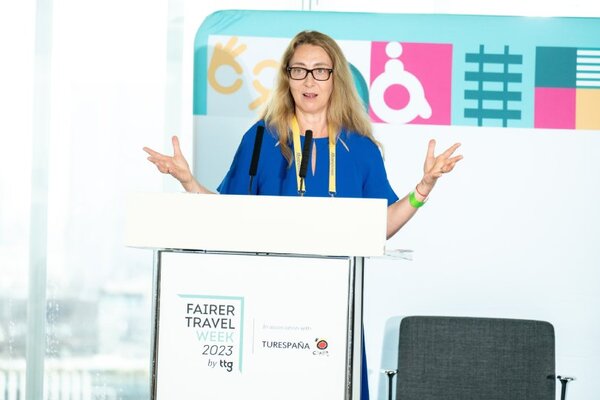Carbon budgeting to become 'a necessary step to stay ahead of regulation'
The travel industry must start preparing to account for its carbon output as it would its financials, Advantage conference delegates were told on Wednesday (16 May).
Addressing the conference in Cancun, Sarah Whiting – channels solutions lead at Advantage’s sustainability partner Thrust Carbon – said carbon budgets will become a "necessary step to stay ahead of regulations".
"We are not in the business of not travelling," she said. "But of travelling with purpose and intention [and] making the most of every trip we take."
The EU is currently progressing legislation to make carbon accounting law, and the UK government is understood to be working on comparable legislation with similar aims.
Whiting was speaking shortly after Advantage revealed it has extended its partnership with Thrust Carbon to provide members more resources to support their sustainability journeys and help them measure, analyse and reduce their carbon impact.
Thrust Carbon is also supporting Advantage’s aim to reduce the carbon impact of its events and conferences, starting with its 2024 conference, which Whiting revealed would generate 694 tonnes of CO2 equivalents.
Pre-conference analysis, she said, had allowed Advantage to save 164kg of CO2 equivalents – comparable with the production 3,600 plastic bags. Advantage has also offset all delegates’ travel to and from the conference through a project in South America, she added.
Carbon savings came from reusing lanyards from previous events and minimising the use of single-use plastics, with 80 conference delegates set to participate in a beach clean as one of several Travel as a Force for Good sessions.
Advantage chief executive Julia Lo Bue-Said said the consortium wanted to take a lead on pioneering purposeful events and, in essence, put its money where its mouth is.
The conference also head from Lauri Reishus, president and chief executive of the US-based Airlines Reporting Corporation (ARC), who told delegates it was her belief carbon change represented the largest risk to the travel industry.
Reishus said global access to sustainable aviation fuel has become "a global imperative" for the travel industry, one that would give it the "moral licence" to operate.
However, presenting data from ARC and Phocuswright on the factors impacting the industry most commonly cited by travel advisors, the list is dominated by concerns around the increased cost of travel (81%) and high airfares and fees (73%).
By comparison, issues such as rising fuel costs (22%), natural disasters (15%), geopolitics (13%) and epidemics/pandemics (11%) ranked towards the bottom of their list of concerns.
Be inspired to take the next steps in your sustainability journey
Join us for a full day packed with practical advice and honest case studies, designed to help you make a real difference to your business’s sustainability strategy and create a fairer industry for customers, staff and the destinations you operate in.
Sign up for weekday travel news and analysis straight to your inbox

James Chapple
Supplier Directory
Find contacts for 260+ travel suppliers. Type name, company or destination.














